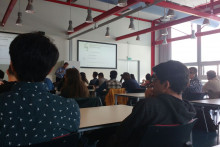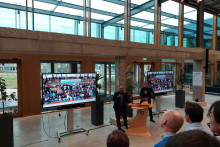Melissa Morales, MSc student Sustainable Energy Technology was at the lecture. ‘The information I got about work after study during the Winter Kick-In in February wasn’t sufficient for me,’ says the Mexican student. ‘By following this lecture, I hope to get to know more about my future.’
Brigitte Leurink of International Student Support took the initiative for the lecture. ‘When we evaluated the Kick-In, we found that students have the need for more information about finding a job after you’re done with your study.’
In the hour that followed, Hemo Oumenad talked about the basics of finding a job. ‘Get to know yourself and your skillset. Figure out what you really want. Then, your future employer will know what they’re getting.’
Finding a job
Through websites and specific UT programs like JobTeaser and the Career Development Program students are meant to find a job more easily. A so-called ‘search year’ is also an option. As an international student, for up to three years after graduating you’re allowed to find a suitable job in the Netherlands. You would have to pay € 283 for that.
The Chinese SET student Xiucheng Huang thinks finding a job is quite well taken care of in the Netherlands. ‘In China, we don’t have websites that give you an overview of available jobs in the sector you want to work in. As a matter of speaking, you have to go out in the streets and find a job. This lecture really helped me.’
Oumenad also recommended the students to look at traineeships. ‘You won’t be getting much of a salary, but it’s a good start. If you’re done with your traineeship, often the company you’ve worked for offers you a job. If not, you’ll always have an experience to add to your résumé.’
Speaking Dutch
According to Oumenad, speaking the Dutch language can really give an advantage when you’re applying for a job. But when she asked who’s practicing speaking Dutch, laughter arose from the room and only a few people raised their hands. Apparently, there’s still room for improvement.







